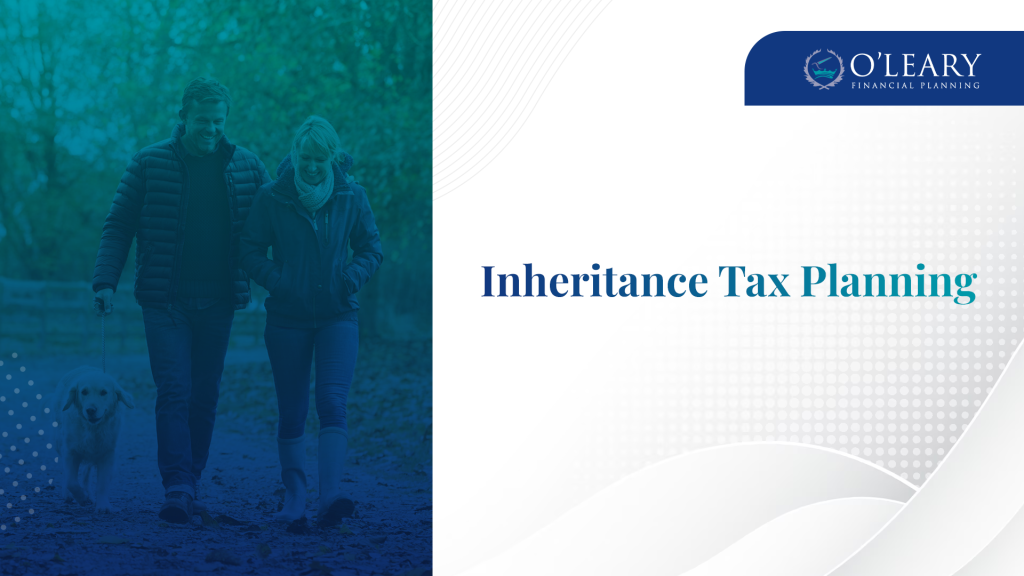Anyone who owns property or other assets should make a Will. Having an up-to-date Will means your assets will be distributed according to your wishes. More importantly, your family is spared a complicated and drawn-out administration of your estate as set out by the Succession Act 1965. Dying intestate (without making a Will) means your personal representative, often a spouse has to obtain a grant of Letters of Administration in order to distribute the proceeds of your estate to your beneficiaries.
Leaving assets to someone other than your spouse or civil partner could mean that they are liable for 33% inheritance tax if the sum is in excess of the threshold. Tax is levied on the total net value of all assets received and includes the family home, investment properties, cash, life assurance benefits as well as house contents, jewellery, etc.
This is where good financial planning is critical. At O’Leary Financial Planning we can help reduce your tax bills, in particular, inheritance tax payable by your beneficiaries. A ‘Section 72’ Whole of Life Policy can be set up to help offset any inheritance liability and it’s been approved by the Revenue Commissioner. It’s taken out specifically to pay inheritance tax and therefore it’s not liable to tax.
Inheritance Tax Thresholds
The thresholds are the combined tax-free amounts available for both inheritance and gift tax. The table below shows the current CAT thresholds as of 13 December 2017. Above these amounts, the current tax rate is 33%.
| Group | Relationship to the Deceased | Threshold amount |
| A | Child (adopted child, step-child and certain foster children) or a minor child of a deceased child of the policyholder | €335,000 (budget 2020) |
| B | Parent*, Sibling, Niece, Nephew, Grandchild | €32.500 |
| C | Applies in all other cases | €16,250 |
*In certain circumstances a parent taking an inheritance from a child can qualify for Group A status. For more information on this see www.revenue.ie/en/tax/cat/index.html
How to mitigate your tax bill?
Small Gift Exemption
Each of your children can receive €3,000 per annum from you and your spouse without any Gift Tax implications. Normally a savings policy is set up in each of their names.
Family Home Relief
There is a complete exemption from Inheritance Tax on the value of the family home if certain conditions are met. To qualify for the exemption the person who inherits the house must:
- have lived in the house for 3 years prior to your death
- At the date of the inheritance, they must not hold an interest in any other residential property. This includes any ‘Buy to Let’ property previously owned
- The ‘child’ must continue to live in this house as his/her main residence for 6 years after your death
Furthermore, owning a share in another property means this relief will not apply.
Section 72 – Life Assurance Relief
The relief provides that where a life assurance plan is put in place to provide solely for the payment of Inheritance tax, Revenue will not tax the proceeds of the policy if the money is used to pay the inheritance tax arising from the death of the policyholder.
Relief is granted subject to certain conditions:
- The plan must be made expressly under the provisions of Section 72. Normally the plan is endorsed to this effect when it is issued.
- To qualify for Section 72 relief the person covered under the plan must also pay the premium.
- A joint-life plan can only be taken out by a married couple or registered civil partners.
- The Policy must be a flexible/whole of life plan to be acceptable to the insurer.
If the policy is put in place to pay the inheritance tax liability (ie put in trust for the beneficiaries to pay the actual inheritance tax bill) this is acceptable to Revenue.
For more information about Inheritance Tax Planning or to answer your queries about other Tax Relief Benefits call us on 091 778678 or email advice@olearys.ie

